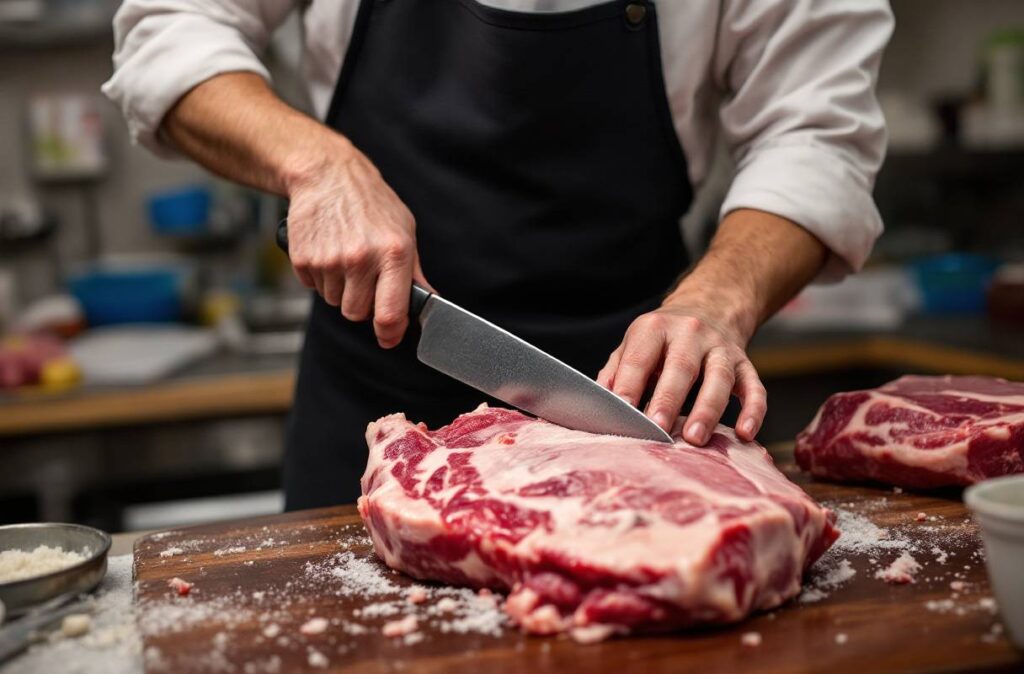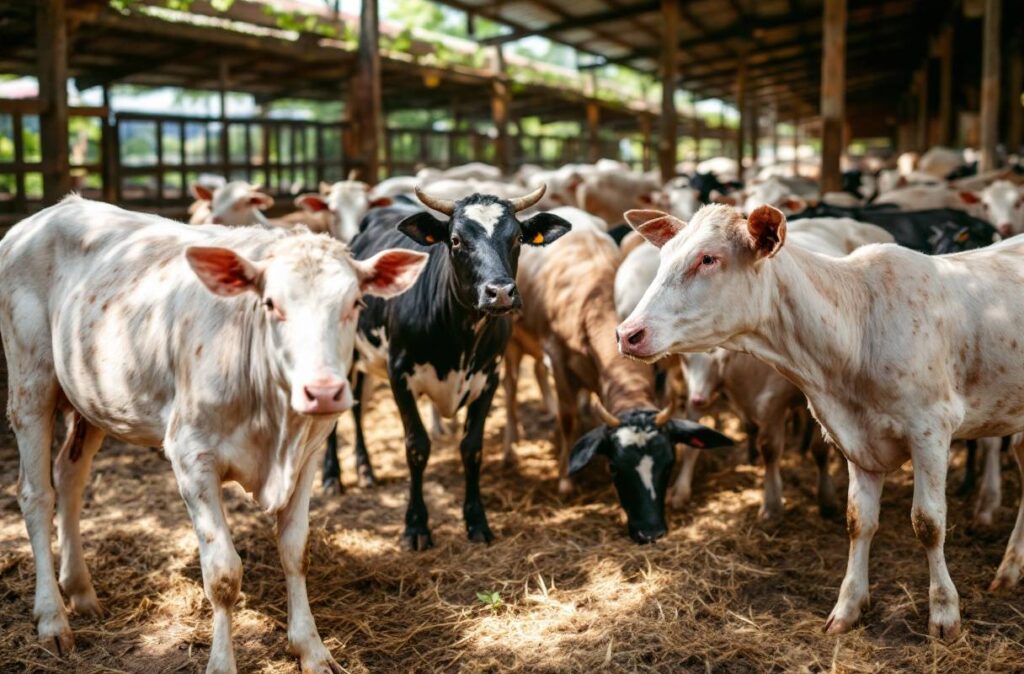Imagine savoring a delicious meal that not only delights your taste buds but also aligns perfectly with your values and beliefs. Welcome to the world of halal dining, where every bite is a testament to tradition, compassion, and inclusivity.
Whether you’re a seasoned halal enthusiast or just curious about crafting a diet that respects both cultural and ethical standards, this guide will elevate your plate to new heights.
Let’s embark on a flavorful journey that harmonizes faith, health, and culinary excellence!
Understanding Halal Food
Halal Defined
Halal food is any chow cleared by Islamic rules laid out in the Quran. Basically, if it’s not written as forbidden, it’s fair game! That means, you can munch on almost anything, from halal meat to halal chicken, and even chug halal drinks. So, it’s not as complicated as it sounds!
Importance of Halal Guidelines
The whole halal thing comes from the Qur’an, hadiths, and what Islamic scholars have got to say. Here in the U.S., there’s a big push to understand everyone’s plate, so you’ll see halal goodies popping up in big city supermarkets (WebMD).
Now, halal isn’t just about saying “no” to stuff like bacon and booze. It also means treating animals kindly, making sure they’re not suffering much when they’re being slaughtered, and mentioning God while at it. You’ll find halal food restaurants and halal food trucks paying close attention to these rules to dish out meals folks can enjoy without any worries.
Following halal practices is like hitting two birds with one stone—not only do you vibe with religious practices, but you also make sure everyone’s included and respected. You can clearly see the love for halal options in places where people of all cultures hang out, like at those bustling halal buffets catering to all tastes.
Overview Table
| Aspect | Details |
|---|---|
| Sources of Guidelines | Quran, Hadith, Decisions of Scholars |
| Key Prohibitions | No Pork, No Alcohol, Proper Slaughter Only |
| Key Practices | Kindness to Animals, Invocation During Slaughter |
| Common Halal Items | Meats, Chicken, Beverages, Varied Food Options |
Curious about where to snag some halal goodies? Check out spots like halal food near me or find options online to bring to your table!
Halal Food Preparation
Halal Meat Butchering Standards

Ever wondered how your choice at the butcher shop ends up on your plate with a Halal stamp of approval? That’s where the ancient practice of Zabihah comes into play. This traditional method aims to ensure animals are treated right and prepared following Islamic guidelines. Let’s dig into the must-knows of this process:
- Animal Choice: Think of farm favorites like cattle, sheep, goats, and chickens. But steer clear of pigs and their friends; they’re off the Halal chart.
- Alive & Kicking: To meet Halal criteria, animals need to be healthy and alive when the time comes.
- The Sharpest Blade: A quick slice with a properly honed knife helps keep suffering at bay by swiftly cutting key arteries and the windpipe.
- Blessings Spoken: Got to have a Muslim reciting “Bismillah, Allahu Akbar” during the act. It’s a shout-out to Allah and a vital part of the ritual.
- Drain the Lifeblood: Blood’s a no-go in Halal chow, so thorough draining is a must.
These steps make sure your meat respects the high standards set by Islamic teachings. Do you want to learn more about what cuts the mustard? Hop over to our Islamic dietary laws section.
Separation of Halal and Non-Halal
Mixing Halal burgers with non-Halal patties in your fridge? Big no-no! To keep those lines clean and clear, here are some smart tricks:
- Dedicated Spaces: Your Halal meat’s got its own turf in storage, away from any non-Halal intruders.
- Distinct Tools: Each knife and cutting board has its role. Don’t let them cross paths with non-Halal foods.
- Label It Like You Mean It: Things can get chaotic, so label clearly to avoid any food faux pas.
- Staff Know-How: In eateries and food factories, ensuring staff knows the Halal ropes through training is crucial.
These tips help maintain the Halal promise, so Muslim folks can enjoy their meals with peace of mind. Hungry for more? Check out halal food restaurants or halal food trucks to see what’s on offer.
| Aspect | Halal Guidelines |
|---|---|
| Storage | Keep it apart from non-halal |
| Utensils | Use those special tools |
| Labeling | Clarity is king |
| Staff Training | Teach the right ways |
Knowing the ins and outs of Halal prep isn’t just for the kitchen crew; it’s a community thing. Need the lowdown on getting certified or spotting Halal goods? Your next stop is halal certification.
Hosting Halal Restrictions
When you’ve got folks who stick to a halal diet on the guest list, keeping it halal in the kitchen is a must. We’re diving into how to stick to halal guidelines by choosing the right ingredients and steering clear of things mixing where they shouldn’t.
Halal-Certified Products ????
Getting those magic stamps of halal approval ain’t just about peace of mind; it’s about keeping things above board with Islamic dietary laws. Halal-certified means the food has been checked and cleared by legitimate authorities. It ensures your pantry isn’t hiding any sneaky no-go ingredients like booze, pork, blood, or those critters that snack on other critters.
Halal meat got its own stamp of approval, helping Muslims figure out what’s good to eat from vendors and eateries. Check out the label; if it says halal, vegetarian, or vegan, you’re probably good to go.
| Product Category | Halal-Certified Examples |
|---|---|
| Meat | Beef, lamb, chicken from halal-friendly sources |
| Dairy | Milk, yogurt, cheese rocking a halal badge |
| Packaged Foods | Snacks, sauces, frozen meals waving the halal flag |
| Beverages | Juices, sodas minus the booze |
Having options like halal food near me handy means everyone can chow down without worry.
Avoiding Cross-Contamination
Keep it halal by dodging cross-contamination like the plague. That’s when halal gets cozy with non-halal stuff, and things go south.
Catch these savvy steps to keep ’em apart:
- Grab separate utensils, pots, and plates strictly for halal eats.
- Scrub-a-dub all surfaces, gadgets, and gear clean if they’ve brushed up against non-halal bites.
- Have a dedicated shelf for halal goodies outta reach from the non-halal side.
- Bookmark a specific zone in the kitchen for the halal handiwork.
These guidelines ease the stress for anyone crafting a halal meal.
Eateries and caterers on the halal scene need to play by these rules religiously. A modern joint with a halal food menu often shouts out its halal subway and non-halal aisle.
Getting familiar with halal-certified choices and sticking to good hygiene helps hosts cater to halal diners with simple ease. It’s all about hospitality—giving everyone a seat at the table and letting them enjoy their meal without a speck of worry.
Halal Beyond Dietary Restrictions
In the world of Islam, halal is much more than just what you eat. It’s a bigger picture, focusing on playing nice with animals and being friendly to everyone. Let’s dig into what this means.
Animal Welfare in Halal

Taking care of our furry and feathered friends is a big deal when it comes to halal food. It’s not just about what gets put on your plate; it starts way before that. Halal puts a spotlight on how animals are treated from the get-go, all the way to the butcher block.
As WebMD explains, the Zabihah method, used in halal slaughtering, insists the animal should be fit at the time it’s, you know, time. The process happens with a quick slice at the jugular, making sure the goodbye is fast and not a drag. They also give a shoutout to God, honoring the life cycle. It’s all about respect and keeping things as painless as possible.
Following these rules ensures food is not only kind to the animals but also clean as a whistle, which some folks believe can lead to health perks. This level of care links up with “Tayyib,” a halal principle all about keeping things pure, clean, and downright good.
Inclusivity and Respect
Halal isn’t just about food, it’s about making sure everyone’s invited to the picnic. It embraces welcoming those from all walks of life, whatever their faith or culture might be.
By serving up halal food or giving folks a halal food menu at places like restaurants or public events, it helps make everybody feel like they’ve got a spot at the table. It’s a way of tipping your hat to different dietary needs and even spicing up the cultural soup. Restaurant owners and those in the food biz stand to gain a lot by offering halal food buffet options and ticking the halal certification box.
Keeping it halal shows you’re serious about respect—not just for beliefs but also for doing the right thing when it comes to food. That means keeping cross-contamination from spoiling the party between halal and non-halal items, a must for keeping with halal norms.
Here’s a quick look at the main points about animals and how we treat each other in the halal scene:
| Aspect | Description |
|---|---|
| Animal Welfare | Gentle treatment, quick processing, and saying a prayer during the process |
| Inclusivity | Making sure halal options are on the menu for everyone’s food needs and celebrating cultural richness |
Getting the hang of these halal elements goes beyond just following the rules. It’s about nurturing a community that’s all for doing right by others and the planet. For more scoop on staying in sync with halal, check out halal certification and halal food near me on our site.
Islamic Dietary Laws
Permissible Foods
Halal is a term cherished in the Islamic faith, describing what’s cool to eat, according to the Quran. Basically, all munchies and drinks are Halal except when they’re specifically tagged as forbidden. You got your innocent veggies, grains, and most meats and seafood lining up in the Halal category. Check Crescent Rating if you’re curious.
Here’s the lowdown on what’s Halal:
- Veggies and fruits: All plants are in the safe zone.
- Grains and legumes: Stuff like rice and beans are all good.
- Meat and poultry: Need to be prepared according to the Islamic rulebook (we’ll gab about it in a bit).
- Fish and seafood: Pretty much anything splashing around is Halal.
| Food Type | Halal Status |
|---|---|
| Vegetables | Thumbs-up good |
| Fruits | Thumbs-up good |
| Grains | Thumbs-up good |
| Legumes | Thumbs-up good |
| Meat | If halal-certified |
| Seafood | Thumbs-up good |
If you’re in a jam finding Halal eats where you are, resources like halal food near me and halal meat can save the day.
Guidelines for Halal Meat
For meat to sport the Halal label, it’s gotta be handled with care according to some specific Islamic rules:
- Animal Type: First off, the critter must be one of those approved by Islamic law.
- Health Check: It must be alive and well before meeting the butcher.
- Slaughter Technique: A swift nick to the throat with a sharp tool while invoking Allah’s name minimizes pain.
- Who’s Cutting?: The knife-wielder has to be a Muslim.
- Storage Smarts: No bunking with non-Halal meat—gotta keep things separate to prevent any unholy mix-ups. Props to WebMD for the info.
You’ll want this in mind, especially if you’re planning to open a halal food restaurant or ordering halal food online.
| Standard | Requirement |
|---|---|
| Animal Category | Pre-approved by Islam |
| Animal’s Condition | Living the dream (alive and healthy) |
| Slaughter Method | Quick snip with a sharp knife |
| Butcher’s Faith | You guessed it, Muslim |
| Storage and Processing | Keep it Halal, keep it separate |
Checking off these boxes ensures your meat is right by the faith and ethically sourced. For more in-depth views, hit up our full take on halal meat and get specific with stuff like halal chicken.
Stick to these rules, and you’ll enjoy tasty bites without wandering off the path of your beliefs. Restaurant folks and foodies in the industry can also cash in by giving Muslim customers what they need—certified Halal goodness.
Benefits of Halal Food
Health Benefits of Halal
More folks are catching on to the perks of munching on halal. It’s not just about faith; it’s about clean and healthy eats. Halal meat goes through a careful process called Zabihah, which involves slitting the throat of the animal and allowing most of the blood to drain out.
With less blood hanging around, you’re dodging harmful bacteria and toxins, making it a healthier choice on your plate.
Comparison of Halal and Non-Halal Meat
| Aspect | Halal Meat | Non-Halal Meat |
|---|---|---|
| Slaughter Process | Careful Zabihah (drains most blood) | Various methods (might keep blood) |
| Bacterial Contamination | Lower chance | Higher chance |
| Health Impact | Cleaner, less toxin risk | Maybe a little dodgy |
Halal and Tayyib
Halal is not just about what you can eat; it’s about eating well. The Quran doesn’t just recommend halal—it suggests you go “Tayyib” too, meaning food that’s wholesome and clean. Think of it like choosing between junk and organic food.
Characteristics of Tayyib Food
| Tayyib Aspect | Description |
|---|---|
| Cleanliness | No yucky stuff or toxins allowed |
| Wholesomeness | Packed with good nutrients |
| Quality | Often organic, naturally done |
When you roll with halal and tayyib, you’re not just sticking to what’s allowed—you’re feeding yourself top-notch, health-boosting goodness. Craving something halal nearby? Whether you’re hunting for halal food near me or curious about halal food restaurants, a diet full of tayyib offers loads of positivity for health.
Plus, checking out halal food trucks and halal food buffet options could surprise your taste buds with a smorgasbord of nutritious and tasty picks.
Halal Certification
Why Halal Certification Matters
Halal certification, simply put, is your ticket to winning over folks who follow Islamic dietary rules. Imagine it as a seal of approval showing that food—right down to its last ingredient—sticks to those guidelines.
This isn’t just about putting a label on a package; it’s about giving folks peace of mind, knowing they can enjoy their meals without worrying about sticking to their principles. Trust is key here. When businesses get it right, people stick around.
For the food makers and suppliers out there, snagging a Halal certification opens up a whole new world of customers—like the international Muslim community that’s always growing and looking for new flavors.
By showing the Halal stamp, you’re basically giving them the green light that your grub is good to go. This is also a win-win for restaurant owners and those in the food biz who want to branch out and reel in a larger crowd.
Spotting Halal Products
Ever looked at a package and seen a Halal logo or emblem? That’s your trusty indicator telling you the product isn’t just any run-of-the-mill item; it’s been given the thumbs up by a legit authority. These logos might change a bit from one group to another, but they all follow a distinct pattern that folks familiar with Halal know well.
| Organization | Halal Certification Logo |
|---|---|
| Islamic Food and Nutrition Council of America (IFANCA) | |
| Halal Food Authority (HFA) | |
| Department of Islamic Development Malaysia (JAKIM) |
Getting a handle on these symbols can be a game-changer, especially for those who’ve just converted to Islam or those not from the faith but keen to try Halal food. These logos make sure they’re making savvy choices when loading up their groceries.
Brands, listen up: It’s super important to tag your certified goods correctly. Doing so builds trust and pulls more buyers your way. Need a hand sourcing Halal eats? Check out our guides on finding halal food nearby and halal food online.
Getting cozy with Halal certification and recognizing these logos is a team effort between consumers and businesses to keep the highest levels of dietary respect and religious harmony. Want more nitty-gritty on suppliers and perks? Dive into our tips on halal food restaurants and halal food trucks.
Challenges and Opportunities
The halal food scene is bustling with ups and downs as it makes its mark globally. Grasping these trends is a must for those whipping up halal goodies, the ones munching on them, and the businesses trying to make a buck from this expanding feast.
Challenges in the Halal Industry
The halal biz isn’t all smooth sailing, with hiccups along the way for both creators and consumers. A biggie in the mix is the absence of a universal rubber stamp on halal certs.
Different necks of the woods have their own set of hoops to jump through, leaving folks scratching their heads over what’s legit and what’s not. This can leave folks guessing if what they’re shopping for gets the nod.
Next up, we’ve got the drama of cross-contamination. Keeping halal food away from the non-halal stuff during every leg of its journey is no small task. Companies need to roll up their sleeves and dive deep into super strict methods to prevent any unwelcome mix-ups, which can feel like quite the juggling act.
Then there’s the whole awareness gig. Many outside the Muslim community are still in the dark about the do’s and don’ts of halal living. Spreading the word and educating others on the perks of halal goodies is key to winning over a broader crowd.
| Challenge | Description |
|---|---|
| Lack of Standardized Certification | Different cert bodies have their own rules, leading to a big guessing game. |
| Cross-Contamination Risk | Keeping halal eats and non-halal stuff apart isn’t a walk in the park. |
| Limited Awareness | Non-Muslims need a heads up on the halal way. |
Growth Potential for Halal Market
While there are hiccups, the upswing for halal goodies is massive. With more folks in the Muslim crowd, there’s a bigger appetite for halal stuff, sending out waves of opportunities for businesses looking to broaden their menu and woo a wider audience.
There’s a whole host of agencies out there, offering halal certification and putting food through the wringer to ensure it keeps halal standards from the get-go to the checkout. Scoring that halal seal can spin open new doors and armed consumer confidence, ringing up sales in the process.
And let’s not forget the boom in online shopping. The internet’s reach means getting halal dishes to folks without local options, stretching the market far and wide. Arming your business with an online presence like halal food online is crucial for tapping into this international audience.
We’re also seeing society embracing and nodding respect to halal needs, with eateries and food trucks flaunting halal menus. Trends like halal food restaurants and halal food buffets are buzzing with popularity, allowing businesses to surf this demand wave.
| Opportunity | Description |
|---|---|
| Growing Muslim Population | More Muslims, more halal dishes on demand. |
| Halal Certification | Proper stamps make customers feel good, driving sales. |
| E-Commerce Growth | Online sales boost the halal food footprint. |
| Inclusive Food Services | More dining spots catering to halal needs. |
By eyeballing the hurdles and riding the rising waves of opportunity, the halal industry can flourish and cater to a mixed bag of customers. Need more halal options around your hood? Hop on our halal food near me page or have a peek at our tasty halal food menu for some great bites.
Conclusion
Embracing a halal diet is more than just following dietary restrictions; it’s about honoring tradition, ensuring the ethical treatment of animals, and fostering an inclusive community.
From understanding the meticulous preparation methods to navigating the challenges of certification and cross-contamination, every aspect of halal food preparation reflects a commitment to quality and respect.
As the halal market continues to grow, opportunities abound for businesses and individuals alike to celebrate diversity and promote healthy, conscientious eating.
Whether you’re hosting a gathering, running a restaurant, or simply seeking to align your meals with your values, mastering the art of crafting a halal diet ensures that every plate you elevate is a harmonious blend of taste, integrity, and inclusivity.
FAQs
What does halal mean in terms of food?
Halal refers to food that is permissible under Islamic dietary laws, ensuring it adheres to specific guidelines regarding ingredients and preparation methods.
How is halal meat prepared differently from non-halal meat?
Halal meat is prepared using the Zabihah method, which involves a swift, humane slaughter while invoking God’s name, ensuring minimal suffering and proper blood drainage.
Why is halal certification important for businesses?
Halal certification assures consumers that products meet Islamic dietary standards, building trust and expanding market opportunities within the Muslim community.
Can halal principles be applied to vegetarian and vegan diets?
Yes, halal principles emphasize cleanliness and ethical treatment of all foods, making vegetarian and vegan options naturally aligned with halal guidelines.
What are the health benefits of consuming halal food?
Halal food often involves meticulous preparation methods that can lead to cleaner, less contaminated food, potentially offering health benefits like reduced toxin intake.














